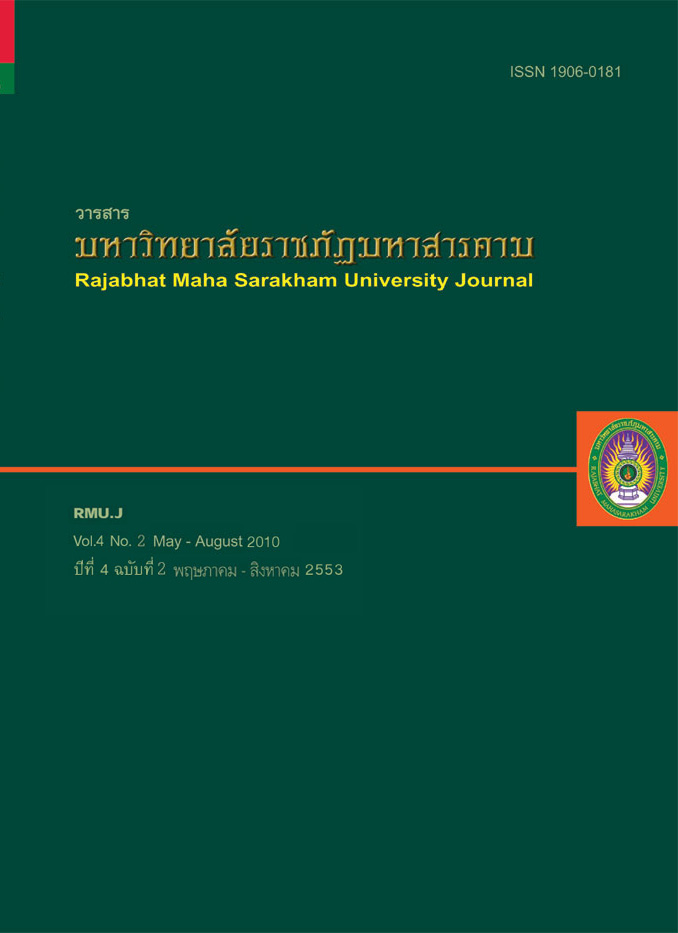การพัฒนาความสามารถในการแก้ปัญหาของเด็กปฐมวัยโดยใช้เกมฝึกทักษะการคิด Development of Problem Solving Ability of Pre-school Children through Thinking Skill Exercises
Main Article Content
บทคัดย่อ
การวิจัยครั้งนี้มีวัตถุประสงค์เพื่อ ศึกษาความสามารถในการแก้ปัญหาของเด็กปฐมวัย ที่ได้รับการจัดประสบการณ์โดยใช้เกมฝึกทักษะการคิด และความพึงพอใจของเด็กปฐมวัยที่มีต่อการเล่นเกมฝึกทักษะการคิด กลุ่มเป้าหมายที่ใช้ในการวิจัยเป็น
เด็กปฐมวัยอายุระหว่าง 5–6 ปี ที่กำลังศึกษาอยู่ชั้นอนุบาลปีที่ 2 ภาคเรียนที่ 1 ปีการศึกษา 2552 โรงเรียนบ้านหนองหล่มอำเภอเมือง จังหวัดมหาสารคาม สำนักงานเขตพื้นที่การศึกษามหาสารคาม เขต 1 จำนวน 17 คน ใช้รูปแบบการวิจัยแบบแผน
ผสานวิธี เครื่องมือที่ใช้คือ แผนการจัดประสบการณ์โดยใช้เกมฝึกทักษะการคิด แบบประเมินทักษะการแก้ปัญหาของเด็กปฐมวัยและใช้วีดิทัศน์บันทึกพฤติกรรมและความพึงพอใจ ผู้วิจัยเก็บรวบรวมข้อมูล ดำเนินการทดลองโดยใช้เกมฝึกทักษะการคิด
ตามแผนการจัดประสบการณ์ 15 แผน ใช้เวลา 3 สัปดาห์ สัปดาห์ละ 5 วัน วันละ 20-30 นาที ทำการประเมิน 3 ครั้ง และบันทึกผลคะแนน สถิติที่ใช้ในการวิเคราะห์ข้อมูลได้แก่ ค่าเฉลี่ย ค่าเบี่ยงเบนมาตรฐาน และค่าร้อยละ ผลการวิจัยพบว่า
เด็กปฐมวัยที่ได้รับการจัดประสบการณ์โดยใช้เกมฝึกทักษะการคิด สามารถพูดคุยแลกเปลี่ยนสิ่งที่ตนคิดโดยการเชื่อมโยงประสบการณ์ในชีวิตประจำวันสู่ความสัมพันธ์กับสิ่งต่างๆ พร้อมหาเหตุผลมาสนับสนุนความคิดนั้นๆ แม้ว่าในบางครั้งจะมีการ
โต้แย้งกันแต่ก็พร้อมที่จะรับฟังความขัดแย้งนั้น ทำให้เกิดพัฒนาการการตัดสินใจอย่างมีเหตุผล มีความคิดที่ชัดเจนขึ้น จะเห็นได้ว่าหลังการใช้เกมฝึกทักษะการคิด เด็กจึงมีพัฒนาการในการแก้ปัญหามีแนวโน้มการเปลี่ยนแปลงไปในทางที่ดีขึ้น จากการใช้
แบบประเมินทักษะการคิดครั้งที่ 1 ครั้งที่ 2 และครั้งที่ 3 มีค่าเฉลี่ย เท่ากับ 22.10, 34.68 และ 38.69 ส่วนเบี่ยงเบนมาตรฐานเท่ากับ 1.98, 2.00 และ 1.91 ตามลำดับ และเด็กปฐมวัยมีความพึงพอใจในการเล่นเกมฝึกทักษะการคิด คือ เด็กๆ มีใบหน้าที่
ยิ้มแย้มแจ่มใส สนใจ กระตือรือร้น ในการร่วมกิจกรรม พูดคุยแลกเปลี่ยนความคิดกันได้อย่างมีความสุข สนุกตื้นเต้นกับการเล่นเกมและการแข่งขัน ชอบใจแผ่นเกมที่มีสีสดใสสวยงาม มีความชื่นใจ หลังแสดงออก หมดเวลายังขอเล่นซ้ำอีก
The purposes of this research were to analyze the ability of pre-school students in solving
problems through the thinking skill exercises, and to survey the satisfaction of the students with the
exercises. The target group was seventeen pre-school students in kindergarten 2, who were 5-6
years old in 1/2009 at Ban Nonglom School, Mueang District, Maha Sarakham Province under the Office
of Maha Sarakham Educational Service Area 1. The research instruments were 15 lesson plans and an
assessment form. The data were collected by using videotape for the performance and satisfaction
recording, and the exercises were tried out with the pre-school students for 3 weeks, 5 days a week,
and 20-30 minutes a day. The statistics used were mean, standard deviation and percentage.
The results showed that the students were able to exchange idea by using their daily life
experience with reasons after learning through thinking skills exercises. The finding indicated that the
students improve their problem solving skills. Regarding three times of the skill assessment, it was
found that the average level of their ability was 22.10, 34.68 and 38.69 and the values of the standard
deviations were 1.98, 2.00, and 1.91 respectively. Additionally, the finding indicated that the pre-school
children were satisfied with the exercises. They were happy, active, interested in exchanging idea,
excited at competitive exercises. They liked most because of the colorful exercises, and they wanted to
play again and again.
Article Details
1. บทความที่ลงตีพิมพ์ทุกเรื่องได้รับการตรวจทางวิชาการโดยผู้ประเมินอิสระ ผู้ทรงคุณวุฒิ (Peer Review) สาขาที่เกี่ยวข้อง อย่างน้อย 3 ท่าน ในรูปแบบ Double blind review
2. ข้อคิดเห็นใด ๆ ของบทความที่ลงตีพิมพ์ในวารสารมหาวิทยาลัยราชภัฏมหาสารคาม นี้เป็นของผู้เขียน คณะผู้จัดทำวารสารไม่จำเป็นต้องเห็นด้วย
3. กองบรรณาธิการวารสารมหาวิทยาลัยราชภัฏมหาสารคาม ไม่สงวนสิทธิ์การคัดลอกแต่ให้อ้างอิงแสดงที่มา


